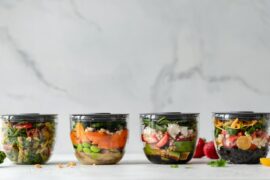Your dietary choices obviously have an impact on your body. Why else would you be trying juice cleanses, keto and a myriad of other diets? When you want to change your body, you alter your eating habits, plain and simple. However, the food you eat affects more than just your waistline. What you choose to put on your plate directly impacts our planet’s health — and some items may have more negative consequences than others.
Here’s what to eat to support yourself, the planet and future generations.
Which Foods Are Sustainable?
In short, sustainable foods are foods that meet your nutritional needs without compromising the ability of future generations to meet their own needs. A diet of sustainable foods will have little to no negative impact on the environment and help conserve the earth and its resources.
Factors that determine how sustainable a certain food is include its relative cost, biodiversity, health, nutritional availability and general health.
Some of the most sustainable and healthy foods include vegetables, fruits, nuts, legumes and whole grains. On the other end of the spectrum, the most unhealthy and unsustainable are red meat, processed foods, dairy products and refined sugars. Of course, the standard Western diet typically includes a vast assortment of produce from across the entire spectrum. However, some diets are healthier and more eco-friendly than others.
Vegetarian Diet
Those who follow a vegetarian diet forgo meat and fish and fill their plates with vegetables, grains and fruits. This plant-based diet is much easier on the environment, since production requires less water and land and emits fewer greenhouse gases. In fact, simply substituting beans for beef would free up 42% of U.S. cropland and help the nation achieve 46% to 74% of it’s 2020 GHG target.
Roughly 5% of Americans currently consider themselves vegetarian and likely enjoy a number of health benefits thanks to their diet. Vegetarians tend to have a higher intake of fibre, vitamin C and magnesium than meat eaters. They may also enjoy more stable blood sugar levels, a healthier heart and a lower risk of developing cancer, according to some studies.

Flexitarian Diet
Flexitarians also eat a mainly vegetarian diet. However, they will choose to consume meat, poultry, fish and animal products on occasion. Of course, this diet isn’t as sustainable as one that is completely plant-based. However, swapping out meat for veggies multiple times each week can still reduce your environmental impact.
This style of diet also comes with a variety of health benefits similar to those associated with vegetarianism. For instance, upping your intake of vegetables and limiting meat consumption can optimize heart health, lower your risk of disease and promote healthy blood pressure and cholesterol levels. The occasional chicken breast or hamburger can also provide iron, protein and vitamins that many plants cannot.
Local Food Diet
Local food diets are often more sustainable than the typical Western diet as well. For most foods, most GHG emissions result from land use and processes that occur during the farming stage. However, the miles your food travels to reach your plate can also result in carbon emissions. Thus, some people choose to consume mostly local produce, relying on whatever foods are in season at the time.
Of course, locally grown foods will typically require less packaging and be healthier than a grocery store pizza or box of mac and cheese. However, a local food diet isn’t as sustainable as a vegetarian or flexitarian diet. Transport accounts for less than 10% of food production emissions. In beef herds, it only accounts for 0.5%. Therefore, in terms of sustainability, what you eat matters more than where it came from.

Start Small
If you want to do your body and planet a favour, one of the best things you can do is change your diet. Begin by making small changes like swapping out meat for beans once a week. Then, slowly work your way up to limiting or omitting certain foods completely. Add more sustainable foods to your plate and keep long-term health in mind. The decisions you make today will shape your future — and the future of the entire planet. No pressure.
Author Bio
Jane is an environmental writer and the founder and editor-in-chief of Environment.co where she covers sustainability and eco-friendly living.

































